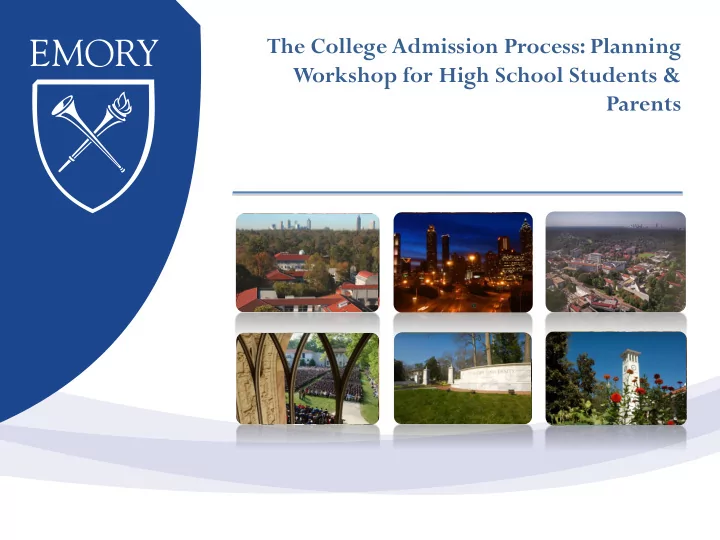

The College Admission Process: Planning Workshop for High School Students & Parents
Different types of colleges and universities A university is an institution of higher education and research, which grants academic degrees in a variety of subjects. A university provides both undergraduate education and postgraduate education. University of Georgia- Georgia State University – Georgia Tech A community college , sometimes called a county college , junior college , technical college , or a city college , is an educational institution providing higher education and lower-level tertiary education, granting certificates, diplomas, and associate's degrees. Georgia Perimeter College- Atlanta Metropolitan College Liberal arts colleges are primarily colleges with an emphasis upon undergraduate study in the liberal arts. A liberal arts education is defined as a "college or university curriculum aimed at imparting general knowledge and developing general intellectual capacities, in contrast to a professional, vocational, or technical curriculum." Emory College-Agnes Scott College – Berry College A vocational school provides vocational education and is also referred to as a trade school or career college . They are operated for the express purpose of giving students the skills needed to perform a certain job or jobs. Atlanta Technical College-Gwinnett Technical College Historically Black Colleges and Universities (HBCUs) were established before 1964 with the principal mission of educating African Americans and have long played a vital role in the U. S. educational system. Morehouse – Spelman-Clark Atlanta
Other Factors to Consider When Applying to Selective Institutions • Major and Minors offered • What does the school specialize in? • Diversity • Physical location of School • Retention rates • Support services in place • Scholarships/Financial Aid Programs • Campus climate • Social setting
Admission Plan Types • Rolling • Range of institutions – from large state schools (University of Maine and Hawaii Pacific University) to liberal arts colleges (Barry University) and others (Parsons New School of Design) • No deposit required • Deadline: Determined by the school • Notification: Determined based on the application submission date • Deposit: May 1 (usually)
Admission Plan Types • Regular Decision • Multiple applications • Deadline: January/February • Notification: April 1 • Deposit: May 1
Application Plan Types • Early Action • Non-binding • Deadline: November 1 or 15 • Notification: December/January • Deposit: May 1 • Early Decision • Binding (contract) where student, parent and counselor sign document • 1 st choice school • Commitment with deposit once accepted • Deadline: November 1 or 15 • Notification: December • Deposit: December/January
Perspective- SAMPLE FRESHMEN CLASS Prospects to Alumni Prospects 45,000 23,747 Applicants 5,234 Admits 1417 Enrolled Retention Alumni
2017 Admit Rates at Most Selective Institutions School Class of 2021 Class of 2020 Admission Admission Rate Rate Brown University 8.3% 9% Columbia University 5.8% 6.04% Cornell University 12.5 % 13.9% Duke University 9 % 10.4% Emory University 21.8 % 25.2% Harvard University 5.2% 5.2% Johns Hopkins 11.8% 11.5% University Princeton University 6.1% 6.46% Stanford University 4.65 % 4.69% Vanderbilt University 10.3% 10.4% Washington University in St. 16% 17% Louis Yale University 6.9 % 6.3%
Selection Criteria • What do colleges and universities consider? • What is your role as a student?
Selection Criteria – Curriculum HIGH SCHOOL STUDENTS AP Courses- English, Calculus, Languages, Science, History, and Micro/Macro Economics courses Perceived “easy” AP’s: Art History, Psychology and Statistics I.B Programs – Being Enrolled in the Diploma Program completing higher level courses through “Theory of Knowledge” Advanced/Honors Courses- Classes beyond the traditional College Prep Track College Courses/Dural Enrollment - Core Courses (Math, Science, Languages, and English)
Selection Criteria – Personal • Extracurricular Involvements • Leadership • Community Service • Special Talents Abilities • Essays • Recommendations • Counselor and (2) Teachers • Other: special circumstances = additional information on the Common Application
Selection Criteria – Recommendations • Counselor Recommendation • Overview of the student • Picture of the student within the class and context of the school • Involvements in and outside of school • Teacher Recommendation(s) • Classroom experiences • Intellectual vitality • Consider perspective that the teachers will give the admission committee = 1 humanities and 1 math/science teacher (?)
Selection Criteria – Essays • Consider your “essay” to be a PERSONAL STATEMENT • Question to consider: What can the application reader learn about you that has not been illustrated in other parts of your application?
Selection Criteria – Test Registration • • SAT ACT • September 9, 2017 • August 26, 2017 • October 28, 2017 • October 7, 2017 • December 9, 2017 • November 4, 2017 • February 10, 2018 • December 2, 2017 • April 14, 2018 • • March 10, 2018 June 19, 2018 • July 14, 2018 • May 5, 2018 • June 2, 2018 Registration usually happens at least one month prior to the exam
Emory Courtesy Scholarship • The benefit amount you receive as a faculty or staff member is determined by, years of service and area of Emory you work for (Healthcare or University). • You will need to contact your HR representative to determine your eligibility amount . • Undergraduate Admission takes into consideration children of Faculty and Staff members in the review process. • Legacy includes, Parents, Siblings, and Grandparents. • The Courtesy Scholarship is the same for both Emory and Oxford College
Ques estions tions & Discu cuss ssion on Contact Information Timothy L. Fields Associate Dean Office of Admission - Undergraduate Emory University 1390 Oxford Road NE Atlanta, Georgia 30322-1016 Phone: 404.727.4308 Fax: 404.727.4303 Email: tlfield@emory.edu Web: apply.emory.edu
Recommend
More recommend